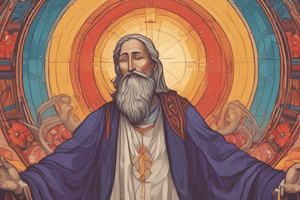Podcast
Questions and Answers
What is the purpose of Psalm 148 according to the content?
What is the purpose of Psalm 148 according to the content?
- To invite all humanity to glorify and praise the Lord
- To tell the story of the saint of the day
- To invite nature to praise its Great Creator (correct)
- To praise St. Mary the mother of God
What is the meaning of the Greek word 'psali'?
What is the meaning of the Greek word 'psali'?
- Hymn or glorification to our Lord Jesus Christ (correct)
- Praises of the Holy Spirit
- Glorification of St. Mary the mother of God
- The story of the saint of the day
What is the main difference between the Adam and Batos Psalis?
What is the main difference between the Adam and Batos Psalis?
- Adam has a faster tune and Batos has a slower tune (correct)
- Adam is used for special occasions and Batos is used for daily prayers
- Adam is used on Sundays and Batos is used on Wednesdays
- Adam is used on weekdays and Batos is used on weekends
What is the purpose of the Theotokias?
What is the purpose of the Theotokias?
What is the significance of praising according to the content?
What is the significance of praising according to the content?
Flashcards are hidden until you start studying
Study Notes
The Church and Praise
- The church is the body of Christ, uniting all members, including the struggling church on earth and the victorious church in heaven.
- Participating in prayers and praises with the saints and angels brings joy in the church.
- Praise is the work of angels, with the sole purpose of glorifying God without asking for requests.
The Importance of Praise
- Praising is a constant work of angels and saints around God's throne in heaven.
- Praising has the ability to change evil habits, sanctify thoughts and senses, transfer Christian dogma, and fight the evil spirit.
The Elements of The Midnight Praises and Their Order
- The Midnight Praises consist of the Introduction, First Canticle, Lobsh, Second Canticle, Lobsh, Third Canticle, Lobsh, Psali of the Three Young Youths, Glorification of the Three Young Youths, Commemoration of the Saints, Doxologies, Fourth Canticle, Psali, Theotokia, Antiphonary, and Conclusion.
- The Introduction is the "Ten Thino" sung in a beautiful tune, inviting the children of the light to praise the Lord of hosts.
The First Canticle (Hoos)
- The First Canticle comes from Exodus 15, praising God for the salvation of the Israelites from Pharaoh and slavery.
- It represents the salvation of humanity from Satan through the incarnation of Jesus Christ.
The Second Canticle (Hoos)
- The Second Canticle comes from Psalm 135, offering praise and thanksgiving to God for His mercy and goodness.
- The refrain of each verse is "His mercy endures forever".
The Third Canticle (Hoos)
- The Third Canticle comes from the Continuation of Daniel 3, praising God for saving the three young youths from the fiery furnace.
- It represents the salvation of humanity from the devil's temptations and triumph over evil.
The Psali of the Three Young Youths (Aripsalin)
- The Psali begins with "O, sing unto Him who was crucified, buried and resurrected for us", glorifying God's work with the three youths in the fiery furnace.
The Glorification of the Three Young Youths (Tenoweh Ensok)
- This is a part of the prayer of Azariah, one of the three youths, chanted after the Third Canticle and before the Commemoration of the Saints.
The Commemoration of the Saints
- The saints are role models who triumphed over the world, Satan, and his temptations through God's power.
- We ask for their intercession and prayer to help us complete our struggle and be transferred to the victorious church in heaven.
Doxologies
- Doxologies are glorifications of St. Mary, the angels, and the multitudes of saints.
- We give them respect and blessing, seeking their sympathy and aid in our prayers.
The Fourth Canticle (Hoos)
- The Fourth Canticle comes from Psalms 148, 149, and 150, inviting nature and humanity to praise and glorify God.
- The entire universe, including creation and humanity, participates in praising and glorifying God.
Psali and Theotokia
- Psali is a hymn or glorification to our Lord Jesus Christ.
- Theotokia are glorifications of St. Mary the mother of God, remembering the prophecies and symbols of the incarnation.
Antiphonary (Defnar)
- The Antiphonary is the story of the saint of the day sung in a hymnal tune.
Conclusion of the Midnight Psalmody
- The conclusion of the praises includes the Adam conclusion, fostering feelings of repentance, confession, and trust in God's mercy.
- The Batos conclusion encourages waiting for the second coming of the Lord and eagerness for eternal life.
- The conclusion ends with the prayer of "Lord have mercy" 41 times, seeking God's mercy.
Studying That Suits You
Use AI to generate personalized quizzes and flashcards to suit your learning preferences.




